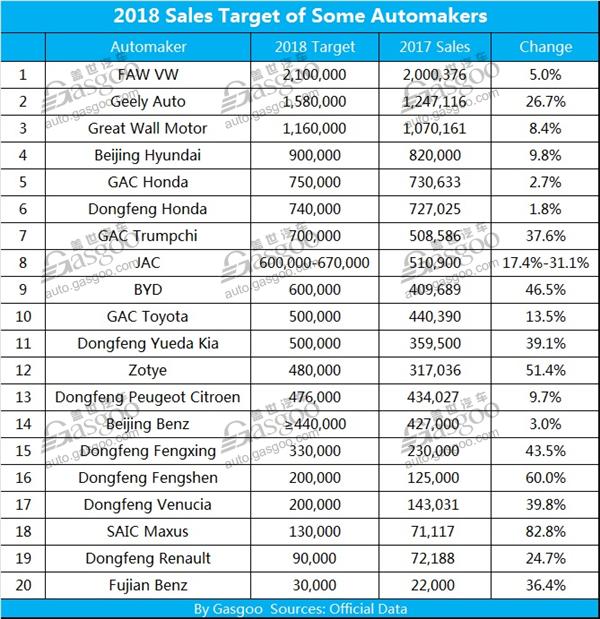The China Factor: Why Premium Automakers Face Headwinds In The Chinese Market

Table of Contents
Intense Domestic Competition
The rise of domestic Chinese brands is a major factor contributing to the challenges faced by premium automakers. These brands are rapidly gaining market share, especially in the premium segment, posing a significant threat to established international players.
- Leading Chinese Competitors: NIO, XPeng, and BYD (particularly its premium "Yangwang" line) are leading the charge, rapidly innovating and capturing significant market share. Other emerging brands are also making strides.
- Competitive Advantages: Domestic brands often leverage advanced technologies, including cutting-edge electric vehicle (EV) capabilities and sophisticated driver-assistance systems. Their competitive pricing strategies, tailored to the Chinese market, further enhance their appeal. A deep understanding of local consumer preferences and a strong emphasis on customer service also contribute to their success.
- Government Support: The Chinese government actively supports the growth of domestic auto brands through various incentives, subsidies, and infrastructure development initiatives focused on the EV sector. This support gives domestic brands a considerable advantage.
Shifting Consumer Preferences
Chinese consumer preferences are evolving rapidly, demanding new features and experiences from their vehicles. This shift poses a significant challenge to traditional premium automakers who may not be adapting quickly enough.
- Electrification is Key: There's an undeniable surge in demand for electric vehicles (EVs) and hybrid vehicles in China, forcing premium automakers to accelerate their electrification strategies. Range anxiety and charging infrastructure remain key considerations.
- Technology and Connectivity: Chinese consumers prioritize advanced technology and seamless connectivity features within their vehicles. This includes intuitive infotainment systems, advanced driver-assistance systems (ADAS), and over-the-air software updates.
- Personalization and Customization: The demand for personalized and customized options is growing. Consumers want vehicles that reflect their individual tastes and lifestyles, necessitating flexible production and configuration options from manufacturers.
- Evolving Brand Perceptions: While brand image and social status remain important, traditional luxury brand perceptions are evolving. Consumers are increasingly seeking brands that align with their values and offer a holistic ownership experience.
Regulatory and Infrastructure Challenges
The regulatory landscape and infrastructure in China present unique challenges for premium automakers. Navigating these complexities requires significant investment and adaptability.
- Stringent Emission Standards: China has implemented increasingly stringent emission standards, demanding significant investments in research and development of cleaner vehicles. Failure to meet these standards can result in substantial penalties.
- Import Tariffs and Taxes: High import tariffs and taxes increase the cost of importing vehicles into China, making it challenging for premium automakers to compete on price with locally manufactured vehicles.
- Distribution and Service Networks: Establishing and maintaining a robust distribution and service network across China's vast and diverse geography is a significant logistical undertaking.
- Data Localization and Cybersecurity: China's data localization requirements and cybersecurity regulations impact how premium automakers collect, store, and process data gathered from their vehicles, requiring careful compliance strategies.
Economic Uncertainty and Geopolitical Factors
Broader economic conditions and geopolitical events significantly influence the Chinese automotive market, creating further uncertainty for premium automakers.
- Economic Fluctuations: Economic slowdowns or growth fluctuations directly impact consumer spending, affecting demand for premium vehicles. Economic stability is crucial for consistent market performance.
- Trade Tensions and Geopolitical Risks: Trade tensions and geopolitical risks can disrupt supply chains, impact investment decisions, and create instability in the market. These uncertainties add complexity to long-term planning.
- Currency Exchange Rates: Fluctuations in currency exchange rates can affect the profitability of premium automakers operating in China, adding another layer of risk management.
Strategies for Success in the Chinese Market
To thrive in the Chinese market, premium automakers need to adopt proactive strategies to overcome the challenges posed by "The China Factor."
- EV Investment: Investing heavily in electric vehicle (EV) technology and charging infrastructure is paramount. This includes developing competitive EV models tailored to Chinese preferences and establishing partnerships for charging networks.
- Product and Marketing Adaptation: Tailoring products and marketing campaigns to resonate with specific Chinese consumer preferences is essential. This requires a deep understanding of local culture, tastes, and social media trends.
- Local Partnerships: Strengthening partnerships with local distributors and suppliers can enhance market access, improve supply chain efficiency, and foster a deeper understanding of the local market.
- Regulatory Compliance: Adapting to the regulatory landscape and ensuring strict compliance with all local regulations are crucial to avoid penalties and maintain a positive reputation.
- Digital Marketing: Leveraging digital marketing and social media platforms to reach and engage Chinese consumers is essential in this highly connected market.
Navigating the China Factor for Premium Automakers
In summary, "The China Factor" encompasses intense domestic competition, shifting consumer preferences, regulatory hurdles, and economic uncertainty. Understanding and adapting to these unique characteristics of the Chinese market is paramount for premium automakers seeking long-term success. Further research and strategic adaptation are crucial for navigating this dynamic market and capitalizing on its immense potential. Don't underestimate the importance of understanding and addressing The China Factor for continued growth and profitability in this vital automotive market.

Featured Posts
-
 Suncoast Searchlight Increased Demand For Mental Healthcare Exacerbates Resource Shortages
May 19, 2025
Suncoast Searchlight Increased Demand For Mental Healthcare Exacerbates Resource Shortages
May 19, 2025 -
 Rafa Nadal Y El Adios A Un Idolo Del Tenis
May 19, 2025
Rafa Nadal Y El Adios A Un Idolo Del Tenis
May 19, 2025 -
 Nyt Mini Crossword Answers Today March 24 2025 Hints And Clues
May 19, 2025
Nyt Mini Crossword Answers Today March 24 2025 Hints And Clues
May 19, 2025 -
 Erling Haaland And Man City Mascot Incident Police Investigation Underway
May 19, 2025
Erling Haaland And Man City Mascot Incident Police Investigation Underway
May 19, 2025 -
 1 70 The New Price Of A First Class Stamp In The Uk
May 19, 2025
1 70 The New Price Of A First Class Stamp In The Uk
May 19, 2025
